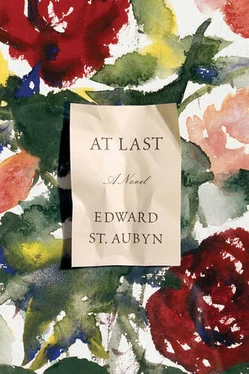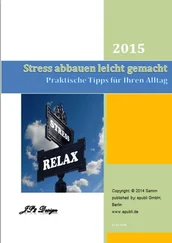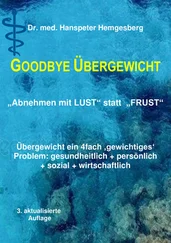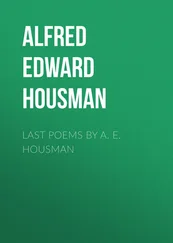He continued to stare at Patrick and Mary in the hope that they would leave. Then he saw, to his horror, that it was not Eleanor’s son but her coffin that was on the move, sliding forward on steel rollers towards a pair of purple velvet curtains.
In other words, hold my hand
In other words, baby, kiss me
The coffin receded behind the closing curtains and disappeared. Mary got up at last and led the way down the aisle, followed closely by Patrick.
Fill my heart with song
And let me sing for ever more
You are all I long for
All I worship and adore
In other words, please be true
In other words, I love you
Finding himself unexpectedly agitated by the sight of Eleanor’s coffin being mechanically swallowed, Nicholas lurched hastily into the aisle, interposing himself between Mary and Patrick. He hobbled forwards, his walking stick reaching eagerly ahead of him, and burst through the doorway into the chill London spring.
Patrick stepped into the pallid light, relieved that his mother’s funeral was over, but oppressed by the party that still lay ahead. He walked up to Mary and Johnny who stood under the barely blossoming branches of a cherry tree.
‘I don’t feel like talking to anyone for a while — except you, of course,’ he added politely.
‘You don’t have to talk to us either,’ said Johnny.
‘Perfect,’ said Patrick.
‘Why don’t you go ahead with Johnny?’ asked Mary.
‘Well, if that’s all right. Can you…’
‘Cope with everything,’ suggested Mary.
‘Exactly.’
They smiled at each other, amused by how typical they were both being.
As Patrick walked to Johnny’s car, a plane roared and whistled overhead. He glanced back at the Italianate building he had just left. The campanile encasing the furnace chimney, the low arches of the brick cloister, the dormant rose garden, the weeping willow and the mossy benches, formed a masterpiece of decent neutrality.
‘I think I’ll get cremated here myself,’ said Patrick.
‘No need to rush,’ said Johnny.
‘I was going to wait until I died.’
‘Good thinking.’
A second plane screeched above them, goading the two men into the muffled interior of the car. Through the railings, beside the Thames, joggers and cyclists bobbed along, determined to stay alive.
‘I think my mother’s death is the best thing to happen to me since…well, since my father’s death,’ said Patrick.
‘It can’t be quite that simple,’ said Johnny, ‘or there would be merry bands of orphans skipping down the street.’
The two men fell silent. Patrick was not in the mood to banter. He felt the presence of a new vitality that could easily be nullified by habit, including the habit of seeming to be clever. Like everyone else, he lived in a world where the same patterns of emotion were projected again and again against the walls of an airless chamber, but just for the moment, he felt the absurdity of mistaking that flickering scene for life. What was the meaning of a feeling he had had forty years ago, let alone one he had refused to have? The crisis was not in the past but in clinging to the past; trapped in a decaying mansion on Sunset Boulevard, forced to watch home movies by a wounded narcissist. Just for the moment he could imagine tiptoeing away from Gloria Swanson, past her terrifying butler, and out into the roar of the contemporary streets; he could imagine the whole system breaking down, without knowing what would happen if it did.
At the little roundabout beyond the crematorium gates, Patrick saw a sign for the Townmead Road Re-Use and Recycling Centre. He couldn’t help wondering if Eleanor was being recycled. Poor Eleanor was already muddled enough without being dragged through the dull lights and the dazzling lights and multicoloured mandalas of the Bardo, being challenged by crowds of wrathful deities and hungry ghosts to achieve the transcendence she had run away from while she was alive.
The road ran beside the hedge-filled railings of the Mortlake Cemetery, past the Hammersmith and Fulham Cemetery, across Chiswick bridge, and down to the Chiswick Cemetery on the other side. Acre upon acre of gravestones mocking the real-estate ambitions of riverside developers. Why should death, of all nothings, take up so much space? Better to burn in the hollow blue air than claim a plot on that sunless beach, packed side by side in the bony ground, relying on the clutching roots of trees and flowers for a vague resurrection. Perhaps those who had known good mothering were drawn to the Earth’s absorbing womb, while the abandoned and betrayed longed to be dispersed into the heartless sky. Johnny might have a professional view. Repression was a different kind of burial, preserving trauma in the unconscious, like a statue buried in the desert sand, its sharp features protected from the weather of ordinary experience. Johnny might have views on that as well, but Patrick preferred to remain in silence. What was the unconscious anyway, as against any other form of memory, and why was it given the sovereignty of a definite article, turning it into a thing and a place when the rest of memory was a faculty and a process?
The car climbed the narrow, battered flyover that straddled the Hogarth roundabout. A temporary measure that just wouldn’t go away, it had been crying out for replacement ever since Patrick could remember. Perhaps it was the transport equivalent of smoking: never quite the right day to give it up — there’s going to be a rush hour tomorrow morning…the weekend is coming up…let’s do this thing after the Olympics…2020 is a lovely round number, a perfect time for a fresh start.
‘This dodgy flyover,’ said Patrick.
‘I know,’ said Johnny, ‘I always think it’s going to collapse.’
He hadn’t meant to talk. An inner monologue had broken the surface. Better sink back down, better make a fresh start.
Making a fresh start was a stale start. There was nothing to make and nothing to start, just a continuous breaking out of appearances from potential appearances, like speech from an inner monologue. To be on an equal plane with that articulation: that was freshness. He could feel it in his body, as if in every moment he might cease to be, or continue to be, and that by continuing he was renewed.
‘I was just thinking about repression,’ said Patrick, ‘I don’t think that trauma does get repressed, do you?’
‘I think that’s now the right view,’ said Johnny. ‘Trauma is too strong and intrusive to be forgotten. It leads to disassociation and splitting off.’
‘So, what does get repressed?’ asked Patrick.
‘Whatever challenges the accommodations of the false self.’
‘So there’s still plenty of work for it to do.’
‘Tons,’ said Johnny.
‘But there could be no repression at all, no secret burial; just life radiating through us.’
‘Theoretically,’ said Johnny.
Patrick saw the familiar concrete facade and aquarium-blue windows of the Cromwell Hospital.
‘I remember spending a month in there with a slipped disc, just after my father died.’
‘And I remember bringing you some extra painkillers.’
‘I salute its ambitious wine list and its action-packed Arabic television channels,’ said Patrick, waving majestically at the post-brutalist masterpiece.
The traffic flowed smoothly across the Gloucester Road and down towards the Natural History Museum. Patrick reminded himself to keep quiet. All his life, or at least since he could talk, he had been tempted to flood difficult situations with words. When Eleanor lost the power to speak and Thomas had not yet acquired it, Patrick discovered a core of inarticulacy in himself that refused to be flooded with words, and which he had tried to flood with alcohol instead. In silence he might see what it was he kept trying to obliterate with talk and drink. What was it that couldn’t be said? He could only grope for clues in the darkness of the pre-verbal realm.
Читать дальше












